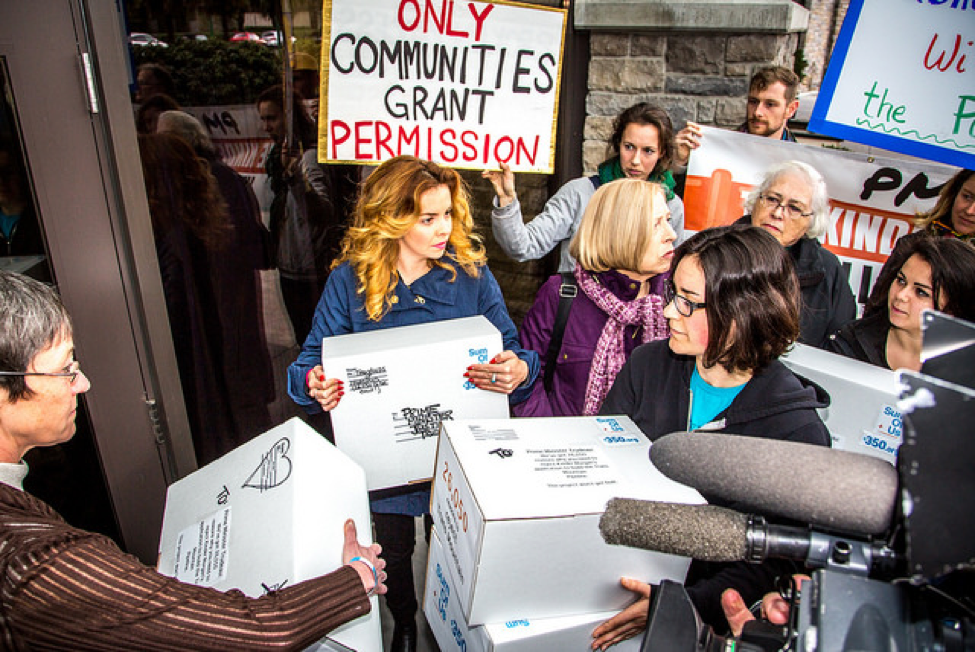Mayor Derek Corrigan of Burnaby, British Columbia speaks to a worried crowd about a Kinder Morgan pipeline to be built in their town (Credit: Mark Klotz, Flikr.).
In late 2014, the Harvard Management Company purchased an utterly whopping $97,944,000 in Kinder Morgan Energy Partners public equity and $47,925,000 in Kinder Morgan, Inc. (KMI) public equity. However, KMI is not a company that reflects the values of the Harvard community. As the largest natural gas pipeline company in North America, Kinder Morgan has repeatedly used ethically questionable tactics such as corporate dishonesty, eminent domain, excessive campaign donations, and environmentally harmful practices in order to advance its own interest at the expensive of society at large.
For instance, KMI has been found to communicate false or misleading information to people living in communities through which their pipelines would run or their compressor stations would lie. In fall 2015, Kinder Morgan’s underlying company, Tennessee Gas Pipeline, included in their newsletter sent out to a New Hampshire community that “benzene, other hazardous air pollutants (HAP), and hydrogen sulfide (H2S) …have been removed prior to custody transfer into the TGP pipeline system” (property of Dennis and Kathie Gauvin, in print). This statement assured worried citizens that in the case of a leak, these hazardous chemicals would not be released into their community’s air supply. However, some community members, the third step on the list of things to do in the case of an emergency (following evacuation and securing of the area) was to monitor the benzene and H2S levels.
Unfortunately, this is not the only instance in which KMI blatantly lied to vulnerable citizens. Another instance occurred in a Massachusetts community affected by the same proposed pipeline. KMI engaged in a push-polling effort by calling local citizens and coaxing them into declaring a statement of support for the pipeline. A CommonWealth article reporting on the effort claimed, “One wonders who would believe any survey that comes out showing significant pipeline support in these towns—communities that have almost universally voted resounding opposition to the [Northeast Energy Direct] pipeline at town meetings,.” KMI has even been accused of “astroturfing,” a strategy in which the company would hire people from unaffected areas to attend town hearings and support a proposed project. One of the most common concerns voiced by legitimate citizens at many of these meetings is that a pipeline’s natural gas may just be exported, causing negligible effect on local energy prices. Allen Fore, VP of public affairs for KMI, attempted to refute this concern by asserting “the idea that gas would be exported from the pipeline is ‘pure speculation’ by pipeline opponents.” However, the aforementioned CommonWealth article points out a contradiction in Fore’s stance—KMI’s filings with the Federal Energy Regulatory Commission clearly show that KMI intends to export much of its liquefied natural gas to Canada. It is clear that time and time again, Kinder Morgan has engaged in misleading or blatantly erroneous discourse with its affected communities to gain a political advantage.
If KMI does not succeed in gaining permission from local communities, it nearly always invokes eminent domain to claim its desired property. Eminent domain is legal action through which the government commandeers privately owned property in order to suit public welfare, while providing some sort of compensation for the affected party (the level of compensation can obviously be a highly contentious issue). The harms of this eminent domain tactic are well addressed in an editorial by William S. Morris III, who tried to fight a KMI pipeline set to snake through his county. In this editorial, published by a newspaper that Morris owns, he points out that Kinder Morgan banks on its ability to overcome the power of everyday citizens with its financial leverage in the courts, using the “power of government” to achieve corporate advantages. He writes,
“[Kinder Morgan] has unlimited resources, an army of lawyers and consultants, and a massive public relations division to push its interests … As , Kinder Morgan survey crews trespassed on private property after being told to stay out. When confronted by a deputy, one crew supervisor said, ‘You can’t stop the pipeline, they have enough money to push the pipeline through the county’ … Obviously I am not poor. But certainly I do not have Kinder Morgan’s money and resources. What I do have is a voice, and one that represents the vast majority of voices on this issue. And I plan to continue using it as this debate continues.”
When Kinder Morgan’s corporate power is not enough, it can rely on its political power. KMI, based in Texas, has been profoundly engaged in both state and national election funding. The company and its executives have been known to engage in abundant political spending since the company’s founding, almost always donating to candidates who either ignore or deny climate change and leave renewable energy initiatives off their platforms. Between 1990 and 2012, Kinder Morgan’s executives donated $1,075,443 to campaigns. The Center for Responsive Politics even reported that Richard and Nancy Kinder are the 32nd most highly donating household in 2016—they donated over $2 million to Right to Rise USA, Jeb Bush’s primary SuperPac for the 2016 presidential election. It is highly plausible that Kinder Morgan executives make these donations to support deregulation of the fossil fuel industry, which would allow higher KMI profits in the future to far outweigh the temporary losses the executives face in the form of donations. If $1 million of donations can assure the company will continue to meet weak FERC regulations and the provision of eminent domain in the future, the millions of dollars generated from foreseeable profits are likely to outweigh the original donations. Moreover, even if KMI does not receive direct benefits as a result of its donations, it is still ethically questionable for a corporation to have such a disproportionate impact on the political process.
Citizens deliver petitions opposing a Kinder Morgan project (Credit: SumofUs, Flikr. No alterations made).
Kinder Morgan is the third-largest energy company in the North American continent—yet it produces and transports no sources of sustainable energy. The corporation has been known to be not only environmentally unfriendly but also dangerous. A Sightline Institute report published in December 2014 describes multiple Kinder Morgan incidents and practices. Among these practices include a Louisiana terminal polluting the Mississippi River, company officials in Oregon bribing a ship’s captain to illegally dump contaminated materials into the sea, and improper maintenance causing a fatal pipeline explosion in California. The report also reveals that KMI has been caught for “stealing coal from customers’ stockpiles, lying to air pollution regulators, illegally mixing hazardous waste into gasoline, and many other crimes.” Many of these infractions were serious enough to be met with fines by the U.S. Government. The report goes on to quote hedge fund analyst Kevin Kaiser who revealed that “Kinder Morgan’s high-level business strategy is to starve its pipelines and related infrastructure of routine maintenance spending.” These cases are only few examples of abundant KMI misconduct; I encourage all readers to read the fifteen-page long Sightline report further or to check out this timeline of mishaps compiled by Bob Croce of the publication Eye on Peabody.
I would like to thank my grandparents, Dennis and Kathie Gauvin, for contributing their personal experiences and accumulated research regarding Kinder Morgan. They have essentially needed to re-enter the forty-hour workweek from retirement in order to fight a KMI pipeline and compressor station trying to nudge their way into my grandparents’ town. The possibility of these projects has already dragged down their property’s value significantly, along with all other property values in the surrounding area. If the projects were to be approved, my grandparents would have little choice but to relocate due to the safety hazards and chronic loud noise. They would essentially be forced to leave the home they’ve shared for most of their lives. There lies a sad irony in the fact that Harvard—the institution my grandparents are so proud to watch me attend— supporting another institution which they have grown to despise. It is just like the sad irony that exists when a university so dedicated to advancing the interests of society and appreciating the values of its constituents invests so much of its money in companies that go against both of those central missions.
New Hampshire residents protesting against a KM project, holding a serpentine “beast” built to represent the snakelike company. (Credit: Dennis Gauvin)
Divest Harvard is a student group that campaigns for Harvard to draw down its investments in fossil fuels, and Democracy Matters is a student group that studies the influence of money in democracy. This piece, part 3 in a series on Harvard’s fossil fuel investments, was prepared by Will MacPhee, class of 2019.


